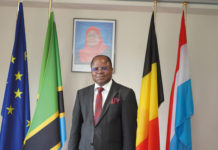The former bread basket of Africa has great potential. Its soil is filled with natural resources, its people are highly skilled and have a good education and the country is well connected by railways and roads, paving the way for access to large regional markets such as the SADEC and COMESA. Coming out of isolation, the country has a bright future ahead.
Looking at the GDP’s composition of Zimbabwe, it’s easy to understand that its economy relies heavily on its mining and agriculture sectors. Historically, the country experienced a decade of contraction from 1998 to 2008 before recording real growth of over 10% per year between 2010 and 2013. The period after that, from 2014 – 2017, saw a 3% drop in economic growth due to bad harvests, low diamond revenue and fewer investments.
While the economy faces some challenges such as improving the investment climate, low mineral prices, improving legislation and the public foreign debt, its government has decided to take actions in these matters to create a private-led economic recovery and to achieve middle income status by 2030. This will be translated in many political and economic reforms, pushing a more private economy and thus welcoming foreign investment. Much like Rwanda, Zimbabwe plans to map out all the investment opportunities, making them known and available through a central investment and trade centre that would be a one-stop shop for foreign investors.
A CHALLENGE BECOME AN OPPORTUNITY
Agriculture and mining are two assets to the economy which suffered in the last decade due to various factors, including the Indigenisation and Economic Empowerment Act. The Indigenisation and Economic Empowerment Act made it mandatory for any company to have a share ownership of 51:49 with a local, indigenous Zimbabwe held owner or company. The country boasts a great climate and year-round agricultural activity, as well as a vast amount of mineral resources such as gold, platinum, diamonds, coal, lithium, nickel, copper and chromium are just a few examples. However dependent on favourable weather conditions, the new government seeks to revitalize agriculture and agro-processing through commercial farms. The arable land of Zimbabwe is very interesting and could be much better exploited. Under the presidency of Robert Mugabe, the properties of some white farmers which were immense, up to 10,000 ha, were seized to redress imbalances from colonial times. President Mnangagwa has already returned some of the unlawfully seized farm properties to white farmers, such as Rob Smart, a farmer whose grandfather started the farm from scratch in 1932, providing many jobs and giving back to the community. The type 3 farms returned are limited in size, up to 6,000 ha to avoid past inequalities.
MINING
The second pillar of Zimbabwe’s economy is mining activities. The country has substantial reserves of lithium, nickel, diamonds and gold. The indigenisation law, which requires 51 percent control by locals in the major sectors of the economy, has been blamed for Zimbabwe’s inability to attract significant foreign investment and create employment. The news to limit this share ownership to platinum and diamond mining sectors only is good news, opening profitable markets in gold, coal, lithium, nickel and copper. Finance Minister Patrick Chinamasa announced the amendment, which came into effect in April 2018. The revival of the agriculture and mining sector also involves new dynamism for the manufacturing industry.
The equipment used in the industry dates back to the sixties and needs modernisation.
In the infrastructure field many possibilities await foreign
investors: be it through rail, train or air transport. Dualisation of roads is one of the prioritiesof the country as well as the development of cargo freight and modernisation of regional airports. Important possibilities exist in the energy sector, mainly in hydra and thermal, as well as the gasification of coal into liquid fuels such as to become self-sufficient in liquid fuel.
TOURISM
The Victoria Falls, one of the world’s Seven Wonders, attracts many visitors to Zimbabwe. The tourism sector also offers many business opportunities: the development of leisure centres, various infrastructure as well as possibilities for safari and hunting, among others.
ATTRACTING FOREIGN INVESTORS
Improving the conditions to attract foreign investors is one of the priorities of the government currently in place. Zimbabwe has the determination to match the best. Opportunities await businessmen in various sectors agriculture, renewable energy like hydropower generation, solar energy systems, bio-fuels, the health sector, animal health, the manufacturing industry, water sanitation, ICT, road, rail and air transport infrastructures, among others. Specific measures are being put in place, such as targeting a better place in the ease of doing business, where Zimbabwe is currently ranked 159th.
SIMPLIFY PROCEDURES
The country has made starting a business easier by removing the obligation to advertise applications for a business licence. In 2017, it made the handling of building permits faster by streamlining the building plan approval process. It also facilitated property registration by launching an official website containing information on the list of documents and fees for completing a property transaction, as well as a specific time frame for delivering a legally binding document that proves property ownership. Special Economic Areas will also be put into place in Zimbabwe.
The objectives are: to restore the country’s capacity to produce competitive goods and services, to create competitive economies of scale, to ensure inclusive growth, to maximize the economic benefits and to attract more foreign investment. Zimbabwe has great potential waiting to be unlocked: highly skilled and literate workers, a strategic and central location in the Southern African Region, it is a regional gateway and it has a logistics hub supported by infrastructure such as railways, roads, powers, access to major regional markets such as the SADC and COMESA, a diversified economy and of course, great natural resources. The perspectives seem interesting, Zimbabwe looks… open for business.
The key message from the Government is the time to invest is now. ![]()
The very instructivemeeting between Honourable Lt General (Rtd) Dr. Sibusiso Busi Moyo, Minister of Foreign Affairs and International Trade and His Excellency Mr. Didier Reynders, Vice Prime Minister and Minister of Foreign Affairs of Belgium in April 2018 and the CBL-ACP Exploratory Mission to Zimbabwe during the same period were major strides in the deepening of co-operation between Zimbabwe and Belgium.
There is no doubt that both Governments are ready to move a step forward in strengthening economic relations. Thus, we strongly welcome and encourage the Belgian private sector to take full advantage of the opportunities available in Zimbabwe for mutually beneficial partnerships. The Embassy is working to ensure that interested Belgian companies are partnered with the right Zimbabwean partners and has already started making arrangements in order to facilitate meaningful Business to Business (B2B) contacts by the time of the CBL-ACP Mission. The main message to the Belgian private sector is that Zimbabwe is Open for Business with all interested partners…. – H.E. Tadeous Tafirenyika Chifamba
![[:fr]2030[:]](https://perspectives-cblacp.eu/wp-content/uploads/2018/07/2030-696x464.jpg)


